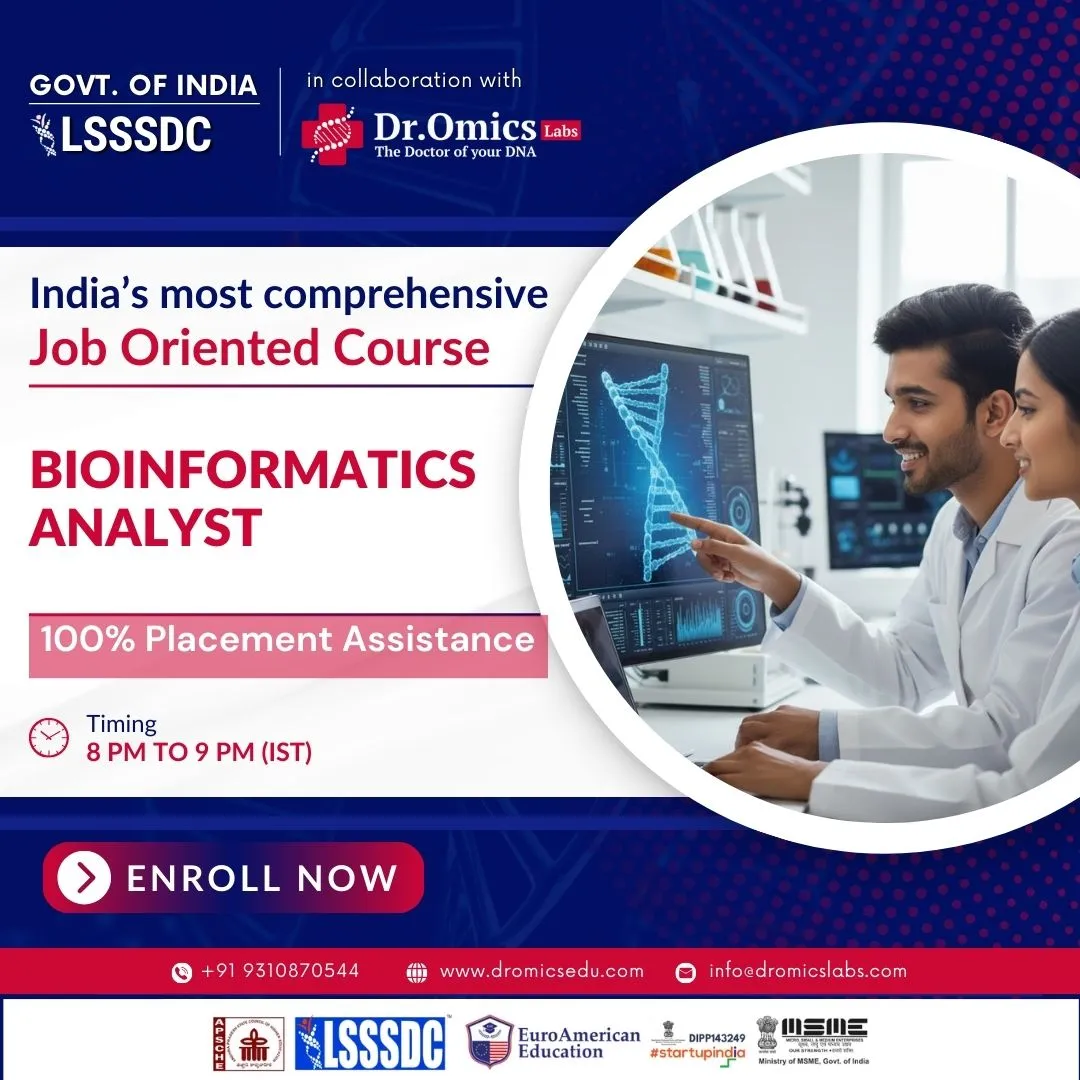Faculty Konnect: Interview with Dr. Kavita Pandey
Your gateway to insightful conversations with leading academicians and researchers. This series aims to bridge the gap between academic pursuits and real-world impact, offering guidance and inspiration for students and aspiring professionals in life sciences.
Today, we feature Dr. Kavita Pandey, Head of Department, Bioanalytical Sciences (Integrated) at GN Khalsa College, Mumbai. Dr. Pandey is a visionary educator dedicated to shaping students into industry-ready professionals, emphasizing practical skills, interdisciplinary learning, and a robust growth mindset.
About Department: Integrated BSc plus MSc in Department of Bioanalytical Sciences (Integrated), an unique multidisciplinary course offered at Guru Nanak Khalsa College, Mumbai. It’s a parallel course to biotechnology with a lot of different instruments and techniques incorporated for better preparedness and better readiness for the industry roles.
Watch full interview on YouTube: https://youtu.be/wZnKG7bfE3I
Q1: Dr. Pandey, could you share what inspired you to pursue life sciences from your early days?
Right from school, I was a very curious child, always asking questions. Biology particularly fascinated me – how our systems work, the intricacies of the natural world. I was good at making models and diagrams, which made me a teacher’s favorite. This curiosity led me to pursue science after 12th grade. Like many biology lovers, I initially aimed for MBBS, but I qualified for BDS. I wanted something unique, so I chose BSc Genetics, which wasn’t offered in Mumbai at the time. I moved to Bangalore, where I pursued triple majors in Genetics, Biochemistry, and Biotechnology. This period was a real feast, offering multiple flavors and subjects, sparking immense curiosity and exploration, and allowing me to discover what I truly wanted in life.
Q2: You moved from Bangalore to Mumbai for your Master’s. What was the turning point that motivated this shift?
That was a significant turning point. During a summer break in Bangalore, I read an article where Kiran Mazumdar-Shaw madam stated she wouldn’t hire Bangalore graduates, implying a need for more practical, hands-on skills. This resonated deeply; I realized my learning was too theoretical and needed to be complemented with practical exposure. My focus shifted from exploration to skill-based learning. I also developed a strong interest in industrial biotechnology, fermentation, and bioprocesses, thanks to my mentor, Madam Merlin Samuel. Witnessing portable instruments and a multichannel pipette for the first time at an exhibition further solidified my interest in industry-relevant skill development. So, I decided to return to Mumbai.
In Mumbai, I opted for an unconventional MSc by research in Bioanalytical Sciences. This was a new course in 2008, offering a mini-PhD like experience focused on a real-world research problem. I was fortunate to have Dr. Babu Vakil as my guide, who brought immense industry experience and ideas to my project, which involved solving a contamination problem for a Hyderabad-based company. This unconventional path aligned perfectly with my goal of skill development.
Q3: After completing your Master’s, you pursued a PhD instead of joining the industry. What was the motivation behind this?
My MSc by research project, which involved solving a real-world contamination issue, made me realize I wasn’t satiated. I wanted to add more skills and dynamics. While a PhD wasn’t a foolproof plan initially, as I gained more exposure and experiences, I realized it was a must. My PhD was not just from an academic angle; it was driven by a desire for industry readiness and problem-solving skills, which gave me a unique adrenaline rush. I wanted to delve deeper into real-life problem-solving, and that’s why I decided to pursue my PhD.
Q4: Despite your industry-relevant PhD, you chose to join academia as a faculty member. What led to this decision?
This decision had a personal element. In September 2016, when I received my PhD, I had a one-and-a-half-year-old son. My motherhood aspirations took precedence. Even though I had industry-relevant skills, I decided to join teaching. However, it wasn’t a compromise. I had always enjoyed taking lectures and conducting practicals since my MSc and PhD days. While some teaching roles didn’t appeal to me, the opportunity at Khalsa College was different. They had excellent facilities with instruments like HPLC, GC, FTIR, which aligned with my bioanalytical background. The department was also going through a challenging phase, which I saw as an opportunity to rebuild and contribute.
I started loving the continuous challenges and the need to adapt to evolving industrial demands – the syllabus for Bioanalytical Sciences changes every three years! As HOD, I gained flexibility to invite guest lecturers, organize workshops, and integrate industry readiness into the curriculum. I found joy in preparing students for real-world scenarios, making it a fulfilling detour with no regrets.
Q5: As HOD, how have you reinvented teaching to emphasize skill development and make students more industry-ready?
Given the unique blend of our subject, I’ve ensured a strong emphasis on hands-on training. Our students, right from their third year, are hands-on with analytical techniques like HPLC and GC. This practical exposure gives them foundational confidence.
Second, in today’s confusing information landscape, I see it as my duty to mentor, guide, and counsel students to understand their strengths and align them with suitable career paths. We regularly invite industry professionals for guest talks, not just for subject matter, but for motivation and inspiration. These interactions reveal industry profiles not easily found elsewhere and ignite curiosity.
I actively collaborate with the industry for campus drives, placements, and internship programs. This requires significant effort, but the successful placement of our students is the reward. We also have an alumni engagement program where our graduates, now in various industry verticals, come back to share their experiences and insights, helping current students align their interests and career paths. These roles, beyond traditional teaching, are crucial for making students industry-ready.
Q6: Based on your extensive experience, what key attributes should students cultivate to succeed in the industry or their careers in general?
The first attribute is openness to learn. In India, we often focus on hard technical skills, but soft skills like resilience, persuasion, perseverance, not giving up, and an open growth mindset are equally vital. Nothing in my journey went exactly as planned, but adapting and making decisions on the go proved beautiful.
Second, do not try to fit into a predefined box. Each of us is unique. You need to identify what you like and align it with industry needs to create your own niche. The times of excelling with just one skill are gone; it’s the era of multidisciplinary sciences. You must be upgradable and willing to learn new skills, even those outside your core field, like data science for bioanalytical students.
Industry needs problem-solvers, not just task executors. This can be developed through research projects and internships. You can’t learn swimming by just reading; you have to get into the water. Internships allow students to witness the scale of industry operations, documentation protocols, and required multitasking skills. Finally, volunteering is crucial. Grab every opportunity to assist seniors or teachers; it’s a platform for exploration and learning, making you a “sponge” ready to absorb knowledge and become industry-ready.
Q7: Looking back at your journey, what advice would you give to students who are confused about choosing between industry, academia, or an unconventional path?
First, don’t rush to fit into a particular role or box. Explore yourself – what are your strengths, what do you truly like? Then, align these with potential career paths, either through self-reflection or by seeking guidance from mentors or role models. The decision shouldn’t solely be about money or designation; long-term satisfaction is paramount. Integrate your passion with a practical career choice for lasting fulfillment.
Second, be open and collaborative. Don’t shy away from discussing your research or aspirations. Ideas often click during discussions. You never know which conversation might lead to a useful connection. Be ready to volunteer and invest your time; see every interaction as an opportunity to learn and grow. Don’t just see a person as a teacher, but consider their position and how they can help you achieve your goals. Exploration should never stop; I am still learning, pursuing new diplomas, and planning to delve into AI.
Lastly, there are no shortcuts. Stay within ethical codes. Work on your soft skills, especially patience and resilience, which are crucial in research and industry. Utilize the vast resources available, like Biopatrika‘s platform. Remember, you are unique, and your goal is to create your unique spot in the world. As I often say, there’s no “right” career path; you have to make your chosen path “right” through your decisions and efforts.
For queries related to admissions or department, contact Dr. Kavita Pandey at kavita.pandey@gnkhalsa.edu.in
More Faculty interview here: https://biopatrika.com/category/academia/faculty-konnect/
Explore more
🎤 Career – Real career stories and job profiles of life science professionals. Discover current opportunities for students and researchers.
💼 Jobs – The latest job openings and internship alerts across academia and industry.
📢 Advertise with BioPatrika – Reach the Right Audience, Fast!




